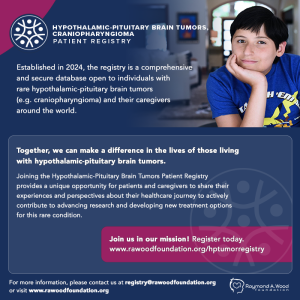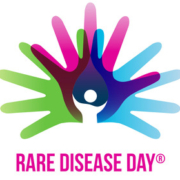2025 Blogs & Vlogs 2 – Pituitary Gigantism: Acromegaly in Children and Adolescents
In this second edition of the 2025 WAPO Blogs and Vlogs series, we are lucky enough to be joined by Professor Márta Korbonits, from the Barts and London School of Medicine at Queen Mary University of London, who is an expert in pituitary gigantism and its genetic causes. Prof. Korbonits explains how this very rare disease is diagnosed and treated and the importance of early multidisciplinary management. She equally talks about the key elements required for a successful transition from pediatric to adult care and how to ensure the best outcomes for patients.
This article provides a summary of the Vlog interview that you can find in English and Spanish on the WAPO website’s Library and YouTube channel.

Can you provide us with a definition of pituitary gigantism and how it differs from acromegaly in adults?
Prof. Korbonits began by explaining that, historically, acromegaly and pituitary gigantism were considered separate diseases. However, researchers later realized that they are actually the same condition, primarily caused by a pituitary tumor (a growth hormone-secreting pituitary adenoma), with the difference being whether the disease starts in childhood/adolescence or adulthood.
Many childhood-onset cases have an identifiable genetic cause, and from this perspective, they differ slightly from adult-onset cases. However, in terms of disease mechanism and what actually happens in the body, she emphasized that pituitary gigantism and acromegaly are the same disease.
When should pituitary gigantism be suspected in children and how is the diagnosis confirmed?
While many might think that pituitary gigantism would be easy to diagnose due to the extreme height of patients, it is actually quite challenging. Prof. Korbonits described how growth patterns vary, and a child growing quickly may not necessarily have the disease. When evaluating a potential case, she stressed the importance of asking about the presence of any additional symptoms such as headaches, joint pain, excessive sweating, acne, sleep difficulties, or delayed puberty, which could be an indication of pituitary gigantism.
The most important measure to evaluate is the child’s growth velocity. Growth charts can be helpful, and she often asks parents to send her their child’s height measurements (such as the height marks made on a door frame) to track growth trends over time, and compare them to percentile lines. Height velocity is also influenced by pubertal hormones, so correlation with those need to be carefully looked at. Normal body height is a highly genetically determined parameter, therefore the height of the parents is important to place the child onto a normally expected growth chart line. If a child’s growth rate appears excessive, further testing is needed.
Beyond growth hormone excess, there is another reason a pituitary tumour can lead to extreme height: delayed or absent puberty. Normally, puberty triggers sex hormones that both accelerate and eventually stop bone growth by closing the growth plates (a process called epiphyseal closure). This process is regulated by the luteinizing hormone (LH) and follicle-stimulating hormone (FSH), which are released from the anterior pituitary gland and control the function of the ovaries and testes. However, a large pituitary tumor can damage the cells responsible for producing LH and FSH, preventing puberty from occurring. Furthermore, in about a third of the cases growth hormone can be released together with another pituitary hormone called prolactin and this hormone inhibits LH and FSH release. As a result, bones do not fuse and patients can continue growing beyond the usual age, sometimes reaching extraordinary heights while showing signs of incomplete puberty (such as lack of facial hair in men and lack of periods in women).

The key biochemical tests used to confirm a diagnosis include measuring levels of growth hormone (released by the pituitary gland) and insulin-like growth factor-1 or IGF-1 (released throughout the body, but levels measured in the blood mostly come from the liver).
These two hormones work together to stimulate the growth plates in the bones to grow. Since growth hormone is secreted in pulses, a single test may not be reliable. To account for this, doctors often perform a glucose suppression test, where the patient drinks a sugary solution. In healthy individuals, this suppresses growth hormone levels, but in patients with a growth hormone-secreting tumor, this suppression does not occur. IGF-1 levels also vary by age and pubertal stage, so interpreting results requires expertise, often from a pediatric endocrinologist. She also suggests that “pediatric endocrinologists may wish to discuss their case management with an adult pituitary endocrinologist, because they have extensive experience with patients with growth hormone excess.”
Finally, if clinical signs and biochemical tests are suggestive of pituitary gigantism, a targeted magnetic resonance imaging (MRI) scan with contrast is performed to identify the pituitary tumor responsible for the disease.
What are the current treatments for children/adolescents with pituitary gigantism?
According to Prof. Korbonits, the primary treatment for pituitary gigantism, in most cases, is surgery and that “it is absolutely crucial that an expert surgeon with experience in treating patients with a functioning pituitary tumor operates on these patients”. If the patient is young, a pediatric neurosurgeon may also be needed.
Pre-treatment with medication before surgery is sometimes an option, but is not always necessary. She also mentions that even in cases where complete tumor removal is impossible, surgery is still recommended as reducing the tumor size can help prevent complications and improve the efficacy of future treatments.
If surgery does not fully cure the patient, there are three types of medications available:
- Dopamine agonists, like cabergoline, which can be used when hormone levels are only slightly elevated or when prolactin is also being secreted alongside growth hormone (this happens in about one-third of cases).
- Somatostatin analogs or somatostatin receptors ligands (SRLs). First-generation SRLs include drugs such as octreotide and lanreotide, while second-generation SRLs, such as pasireotide, are rarely prescribed in children but can be used in some exceptional cases. This group of drugs helps to lower hormone levels and may reduce tumor size or at least stop it from growing further.
- A growth hormone receptor antagonist called pegvisomant, which blocks growth hormone from acting in the body. This drug is very effective in normalizing IGF-1 levels and this is crucial for avoiding severe long-term complications of the disease. However, unlike somatostatin analogs, it does not have an effect on tumor growth. Therefore, patients on pegvisomant require careful monitoring, and if the tumor continues to grow, further surgery, radiotherapy or the addition of an SRL may be necessary.
In the past, radiotherapy was a primary treatment due to the lack of other medical options, but today it is generally avoided in young patients and reserved as a last resort for aggressive cases or when other treatments are not effective.
When should planning for the transition from pediatric to adult endocrinology care take place?
The importance of a smooth transition from pediatric to adult care for patients with pituitary gigantism cannot be overemphasized. Prof. Korbonits explained that the period following the completion of puberty (either spontaneous or medically induced) is often a natural moment for this transition to take place, taking into account that different countries follow different rules.
Since adult endocrinologists encounter growth hormone excess more frequently, she advises that they should be a part of the multidisciplinary team before the formal transition to adult care (usually around the age of 16-18). Conversely, if a patient has not yet gone through puberty, pediatric specialists may continue guiding the process while coordinating with adult doctors. She concludes by saying, “collaboration between pediatric and adult endocrinologist for the care of patients with gigantism, or all patients with a pituitary tumor, is absolutely key to ensure the best treatment and the best management for these patients”.

What are the long term effects of pituitary gigantism and how are they managed?
Prof. Korbonits emphasized the serious long-term effects of untreated pituitary gigantism and the importance of early treatment. If a child is diagnosed and managed early, they can have a good life expectancy with fewer complications. However, the longer they are exposed to excess growth hormone, the greater their risk for complications.
One major complication is extreme height, which can lead to joint pain, neuropathy, early joint replacements, and bone structure issues. These can include a high risk of fractures, the most serious being fractures of the vertebrae (which can lead to spinal deformities).
With prolonged growth hormone excess, secondary hypertension, cardiac muscle disease and diabetes can also occur, usually not presenting until late adolescence or adulthood. Large tumors pressing on the optic nerves can also cause permanent visual field defects, if left untreated. Pituitary apoplexy, a sudden hemorrhage within the tumor, is an acute complication that can destroy normal pituitary function, leading to severe hormone deficiencies and vision loss.
Prof Korbonits also pointed out the psychological impact of excessive height, stating, “We shouldn’t forget the psychological burden of being too tall on both sexes; very often patients feel uncomfortable being ‘stared at’. Females especially may encounter problems finding a partner and starting a family just because of their height”.
Prof. Korbonits highlighted that extremely tall patients were more common 100 or 200 years ago (for example, Charles Byrne, known as “the Irish Giant”). Thanks to advances in medical treatment, which have significantly improved outcomes, we rarely see such extreme cases today.
What factors influence the prognosis of children with pituitary gigantism?
The prognosis of gigantism depends on several factors but the most important is how early the condition is diagnosed and treated. If diagnosed early, the tumor may be confined to the pituitary fossa, allowing for complete surgical removal without the need for further therapy, which significantly improves quality of life. If it is diagnosed later, this often results in a larger tumor, which increases the likelihood of damage to the rest of the pituitary gland. This can result in hormone deficiencies requiring lifelong hormone replacement therapy, difficulties with puberty and fertility, and, if radiotherapy is needed, a higher risk of complications such as cerebrovascular disease (which can result in stroke) and secondary tumors.
Finally she brought attention to the fact that half of gigantism cases have an identifiable genetic cause (such as the AIP gene). While this may not always change the management options, genetic screening allows for the early detection in family members, potentially preventing complications, and thereby improving the prognosis for those individuals.
She concluded by saying that a childhood-onset growth hormone secreting tumour remains an extremely rare disease. Unlike in the past, with the help of modern diagnostic tools and treatments, no patient should end up today as a ‘giant’. Screening, collaborative, multidisciplinary care between pediatric and adult endocrinologists and access to the right medications and treatments are needed in order toachieve this goal, and she confirmed that “this is something which is now possible, and we hope that it will be available for every patient in the world.”
We would like to express our heartfelt gratitude to Professor Márta Korbonits for taking the time to talk to us about this rare and relatively unknown pituitary disorder. If you would like to learn more about pituitary gigantism or about Prof Korbonits’ research (or take part in one of her studies), please take a look at the additional resources below and contact bartshealth.goetstudy@nhs.net.
Additional resources
Familial Isolated Pituitary Adenoma (FIPA) information page: https://www.qmul.ac.uk/fipa-patients/
Read the book, In Search of Giants: The Quest to Find the Genetic Giants of Northern Ireland: https://www.insearchofgiants.org/
Learn more about the Genetics of Acromegaly and Gigantism
Watch the BBC documentary on Charles Byrne, the Irish Giant
Legends and Facts: Population Screening for AIP mutations in Northern Ireland



















